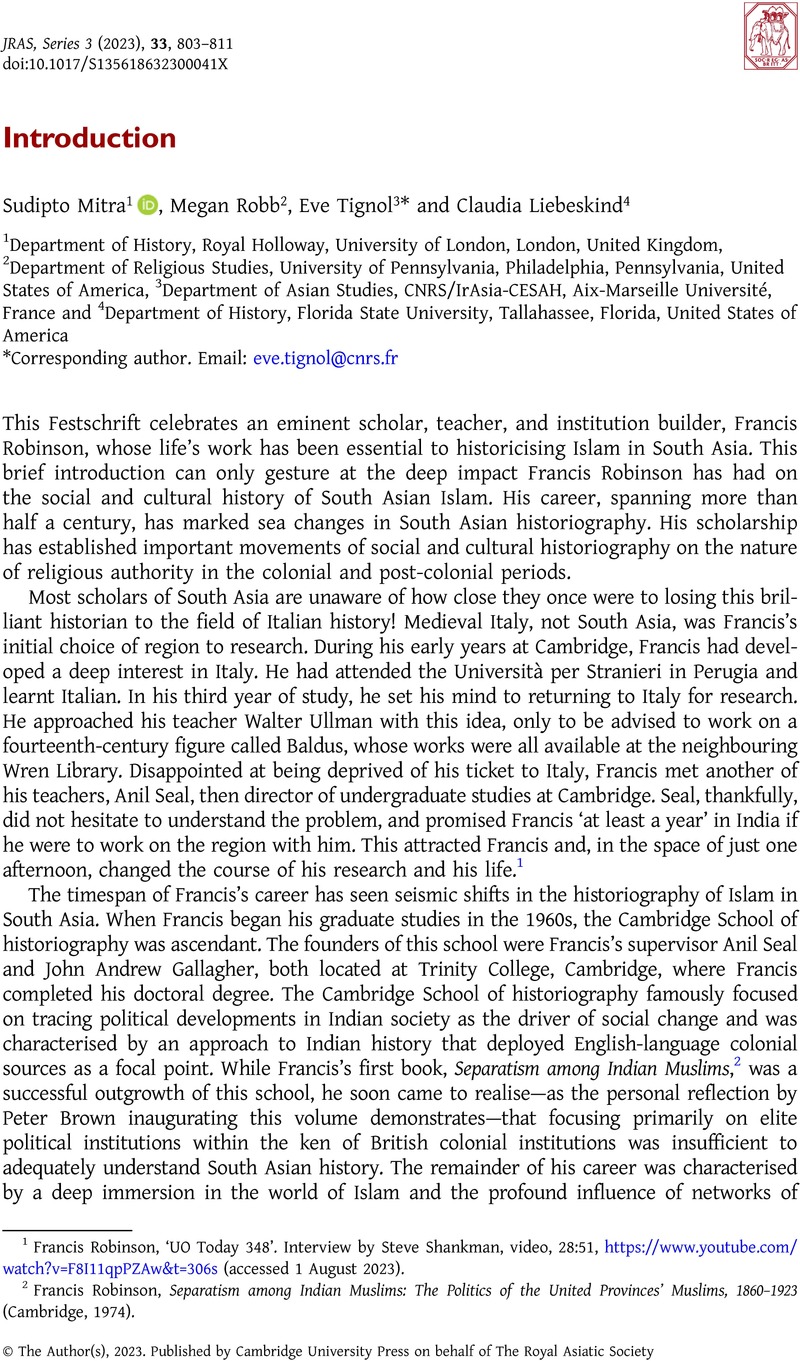No CrossRef data available.
Article contents
Introduction
Published online by Cambridge University Press: 02 October 2023
Abstract

- Type
- Introduction
- Information
- Copyright
- Copyright © The Author(s), 2023. Published by Cambridge University Press on behalf of The Royal Asiatic Society
References
1 Francis Robinson, ‘UO Today 348’. Interview by Steve Shankman, video, 28:51, https://www.youtube.com/watch?v=F8I11qpPZAw&t=306s (accessed 1 August 2023).
2 Robinson, Francis, Separatism among Indian Muslims: The Politics of the United Provinces’ Muslims, 1860–1923 (Cambridge, 1974)Google Scholar.
3 Robinson, Francis, The Muslim World in Modern South Asia: Power, Authority, Knowledge (New York, 2021), pp. 1–2CrossRefGoogle Scholar.
4 Ibid., p. 9.
5 Robinson, Francis, ‘Islam and Muslim society in South Asia: a reply to Das and Minault’, Contributions to Indian Sociology 20.1 (1986), pp. 97–104CrossRefGoogle Scholar.
6 Robinson, Francis, The `Ulama of Farangi Mahall and Islamic Culture in South Asia (Delhi, 2001)Google Scholar.
7 Robinson, Francis, Jamal Mian: The Life of Jamaluddin Abdul Wahab of Farangi Mahall 1919–2012 (Karachi, 2018)Google Scholar; also published as Scholar, Sufi and Politician. The Life of Maulana Jamal Mian of Farangi Mahall 1919–2012 (New Delhi, 2020).
8 Robinson, Francis (ed.), The Cambridge Illustrated History of the Islamic World (Cambridge, 1996)Google Scholar.
9 F. Robinson (ed.), The New Cambridge History of Islam, vol. 5: The Islamic World in the Age of Western Dominance (Cambridge, 2010).
10 Robinson, Francis (ed.), The Cambridge Encyclopedia of India, Pakistan, Bangladesh, Sri Lanka, Nepal, Bhutan and the Maldives (Cambridge, 1989)Google Scholar.
11 Robinson, Francis, Atlas of the Islamic World since 1500 (Oxford, 1982)Google Scholar.
12 Eaton, Richard M., ‘Review of Atlas of the Islamic World Since 1500, by Francis Robinson’, The Journal of Asian Studies 43.2 (1984), pp. 299–301CrossRefGoogle Scholar.
13 Ibid.
14 Robinson, Francis, The Mughal Emperors and the Islamic Dynasties of India, Iran and Central Asia (London, 2007)Google Scholar.
15 An extremely rewarding experience can be recalled in this context: one of Francis Robinson's students once met a scholar called Professor Gangatharan, at the Department of History, Banaras Hindu University. His eyesight was specially abled, but on learning about the student's supervisor, he told him that he had read most of Francis Robinson's works, and that Francis was his ‘favourite historian’. He further explained that it was Francis’s lucid, and at times almost lyrical, prose that made his works extremely attractive to him. After all, he could not read Francis’s works with his own eyes, but had to have them read out to him by someone else.
16 Robinson, Francis, Islam and Muslim History in South Asia (New Delhi, 2003)Google Scholar.
17 For a taste of Richard Cobb's extraordinary letter-writing ability, see Tim Heald (ed.), My Dear Hugh, Letters from Richard Cobb to Hugh Trevor-Roper and others (London, 2011).
18 Francis Robinson, ‘Letter: India's declining secularism’, Independent, 15 December 1992, available at https://www.independent.co.uk/voices/letter-india-s-declining-secularism-1563692.html (accessed 1 August 2023).
19 Namrata Biji Ahuja, ‘Some elements in India will use any stick to beat Muslims’. Interview with Francis Robinson, The Week, 19 April 2020, available at https://www.theweek.in/theweek/current/2020/04/09/some-elements-in-india-will-use-any-stick-to-beat-muslims.html (accessed 1 August 2023).
20 Francis Robinson, ‘English language and higher education’, The Express Tribune, 12 March 2013, available at https://tribune.com.pk/story/519700/english-language-and-higher-education (accessed 1 August 2023).
21 Robinson, The Muslim World in Modern South Asia.
22 He and Freda Harcourt also drafted a select bibliography of twentieth-century world history for this purpose; see Harcourt, Freda and Robinson, Francis, Twentieth-century World History. A Select Bibliography (London, 1979)Google Scholar.
23 Robinson, Francis and Brass, Paul R., Indian National Congress and Indian Society 1885-1985: Social Structure and Political Dominance (New Delhi, 1987)Google Scholar.
24 Young researcher Simool Sen, from Jadavpur University, Kolkata, is to be thanked for suggesting this analogy to one of the authors.
25 Robinson, Francis, ‘Technology and religious change: Islam and the impact of print’, Modern Asian Studies 27.1 (1993), pp. 229–251CrossRefGoogle Scholar. doi:10.1017/S0026749X00016127.
26 Robinson, The Muslim World in Modern South Asia, p. 7.
27 Francis Robinson, ‘Religious change and the self in Muslim South Asia since 1800’, in Islam and Muslim History in South Asia, pp. 105–121; Robinson, Francis, ‘The British empire and Muslim identity in South Asia’, in Islam, South Asia, and the West (New Delhi, 2007), pp. 124–145Google Scholar; Robinson, Francis, ‘Islamic reform and modernities in South Asia’, Modern Asian Studies 42.2 (2008), pp. 259–281CrossRefGoogle Scholar.





